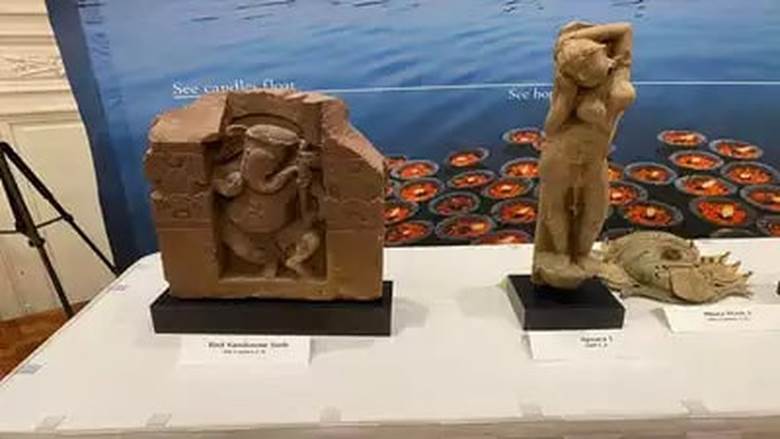ANTIQUITIES

Copyright infringement not intended
Context: The U.S. authorities formally handed over 307 antiquities, estimated to be worth nearly $4 million to Indian officials.
Details:
- Antiquities returned include Vishnu and Lakshmi with Garuda, dating to the 11th century C.E., which was allegedly stolen from a temple in Central India.
- A Chola-era Sambandar bronze idol, a Chola-era Devi idol in stone, bronze idols of Vinayaga, Narasimha with Lakshmi, a wooden idol of Muruga and wooden chauri bearers are other items that had been taken from Tamil Nadu.
- “Antiquity” is an article or object that is at least 100 years old. It could be a coin, sculpture, painting or epigraph, or any object or article taken from a building or a cave, or anything that illustrates the science, art, crafts or customs or religion or literature of a bygone age, or anything of historical interest.
- If it is a manuscript or record of any scientific, historical, literary or aesthetic value, it should be at least 75 years’ old.
- Antiquities in India are governed by The Antiquities and Art Treasures Act, 1972 which falls within the purview of the Archaeological Survey of India ("ASI"), Union Ministry of Culture.
- Possession of an unregistered antiquity is a punishable offence under law.
- Section 14(3)of the Act makes it mandatory for “every person who owns, controls or is in possession of any antiquity” to register it before a registering officer within 15 days of its coming into his control or possession and obtain a certificate of registration.
- Antiquities can be sold, but only by a licensed person. However, Section 3 of the Act prohibits export of an antiquity by anyone other than the Centre or its agencies.
- A jail term of six months, or with fine, or both. Besides, the antiquity is also liable to be confiscated.
- Article 49 (Protection of monuments and places and objects of national importance): It shall be the obligation of the State to protect every monument or place or object of artistic or historic interest, declared by or under law made by Parliament to be of national importance, from spoliation, disfigurement, destruction, removal, disposal or export, as the case may be.
- To facilitate Custom Authorities in allowing non-antiquities to be exported, the Archaeological Survey of India (ASI) has established Expert Advisory Committees to issue non-antiquity certificates.
- An Antique Cellhas been opened in Central Bureau of Investigation (CBI) for investigation into cases of thefts and losses of antique
- National Mission on Monuments and Antiquities (2007) aims to prepare a National Register on Antiquities by documenting antiquities from different sources in a uniform format.




1.png)
